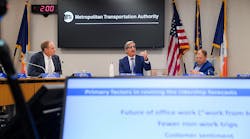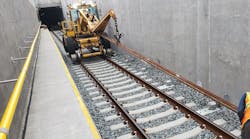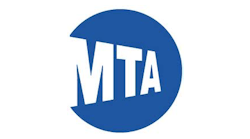New York budget agreement will provide more than $1.1 billion to MTA
An agreement in concept has been reached on the New York state Fiscal Year 2024 budget. New York Gov. Kathy Hochul outlined what was included in the $229 billion agreement and explained the New York’s legislative houses anticipate writing, passing and enacting the budget now that an agreement has been reached.
The budget agreement will provide more than $1.1 billion to Metropolitan Transportation Authority (MTA) through an increase in the Payroll Mobility Tax that will provide relief to MTA’s financial crisis through a stable, dedicated funding stream. Gov. Hochul said MTA is “the lifeblood of New York City” and recognized the budget shortfalls the authority is facing due to the financial challenges of the COVID-19 pandemic.
“The choice was just wait and see what happens, kick the can down the road or launch a bold strategy of sustainability to show up and ensure the viability of the MTA for years to come,” said Gov. Hochul. “Working hard, we rolled up our sleeves again and came up with a plan to generate additional revenue for the MTA through a minor increase in the Payroll Mobility Tax for New York City's largest businesses.”
The agreement includes:
- Increase of the Payroll Mobility Tax for the largest businesses in New York City to 0.6 percent, which will generate approximately $1.1 billion;
- $300 million in one-time state aid;
- A requirement that New York City contribute $165 million for paratransit services funding;
- $65 million to reduce the proposed fare increase on the MTA;
- Expanding service frequencies on the subway;
- Launching a pilot program providing five free bus routes in New York City – one in each borough – to enhance the customer experience.
In addition to the state provided support, MTA will implement a $400 million per year plan to ensure operations are efficient and cost effective.
“With this budget, commuters in the New York City region will know this program will not be jeopardized — we're not cutting services, we're not curtailing our investments in this critical piece of infrastructure,” Gov. Hochul said.
In response to the budget agreement, MTA Chair and CEO Janno Lieber said MTA riders had “no better friend” than the governor.
“Since day one of her administration, she has been working to make sure New Yorkers have safe, reliable and frequent service on subways, buses, commuter railroads and paratransit. We are incredibly grateful to the Legislature, along with the Governor, for this effort to assure the MTA’s long-term financial stability, and we look forward to working with them as we deliver essential mass transit service for New Yorkers,” Lieber said.
New York transit rider advocacy group Riders Alliance praised the commitment to more frequent service in the budget agreement.
“Public transit riders have been gaining power in New York for a decade. Albany’s past transit funding deals left riders waiting longer but this unprecedented budget will finally fund more frequent subway service. The difference today is that riders are organized and know that, in this town, every minute counts. As a result, Gov. Hochul, MTA officials and legislative leaders prioritized shorter waits and faster commutes for millions of New Yorkers,” Riders Alliance Executive Director Betsy Plum said. “Together, riders built a broad and deep coalition drawing support from labor and business groups, climate justice and disability rights organizations to win over a billion dollars in new public transit funding that the MTA can count on for years to come to deliver meaningfully better service than before the pandemic.”

Mischa Wanek-Libman | Group Editorial Director
Mischa Wanek-Libman is director of communications with Transdev North America. She has more than 20 years of experience working in the transportation industry covering construction projects, engineering challenges, transit and rail operations and best practices.
Wanek-Libman has held top editorial positions at freight rail and public transportation business-to-business publications including as editor-in-chief and editorial director of Mass Transit from 2018-2024. She has been recognized for editorial excellence through her individual work, as well as for collaborative content.
She is an active member of the American Public Transportation Association's Marketing and Communications Committee and served 14 years as a Board Observer on the National Railroad Construction and Maintenance Association (NRC) Board of Directors.
She is a graduate of Drake University in Des Moines, Iowa, where she earned a Bachelor of Arts degree in Journalism and Mass Communication.







